- Home
- Mitch Albom
The Next Person You Meet in Heaven Page 10
The Next Person You Meet in Heaven Read online
Page 10
Then Eddie asked about Annie’s existence, saying he’d often wondered what she’d done with the years. Feeling safe in his company, Annie spoke of many things. She spoke of her early childhood, which she remembered one way, fun and carefree, and her life after the accident, which was different.
“What changed?”
“Everything.” She held up her hand. “Starting with this.”
Eddie took her wrist in his meaty palm. He studied the scars as if discovering a lost map.
“After that,” Annie said, “everything I tried went wrong. I couldn’t make friends. I was at war with my mother. I had an awful first marriage. I lost . . .”
Eddie glanced up.
“I lost a child. I suffered depression. I gave up on ever being happy until I saw Paulo again. I thought he was my chance. I knew him. I trusted him. I loved him.”
She paused. “Love him.”
Eddie let go of her wrist. He seemed to be thinking of something.
“Would you change it back? Your hand? If you could?”
Annie stared at him. “That’s so strange. Paulo asked me the same thing when we were kids.”
“What did you say?”
“What I’d say now. Of course. Who would want to go through this if they didn’t have to?”
Eddie nodded slowly, but Annie wasn’t sure he agreed with her.
“Is your wife here?” Annie asked.
“She’s not part of your journey.”
“But you get to be with her? In your heaven?”
Eddie smiled. “It wouldn’t be my heaven without her.”
Annie tried to smile back, but hearing this made her feel worse. Her biggest desire was that Paulo had survived, that his life had been spared by the transplant. But that meant being alone now in the afterlife. Would Paulo move on without her on earth? Find someone else? By the time he died, would he choose a different heaven, one that didn’t include Annie?
“What is it?” Eddie said. “You don’t look so hot.”
“It’s just . . . I ruin everything,” Annie said. “Even the good things. Even my wedding night. It was my idea to help a man on the highway. My pushing to go for a balloon ride.”
She looked down. “I make so many mistakes.”
Eddie glanced to the single star gleaming above them.
“I used to think the same thing,” he said.
Suddenly, day changed to night. The air grew hot and sticky. The landscape turned barren. On naked hills around them, small fires erupted. Annie felt the ground thicken by their feet.
“What’s happening?” she asked.
“We ain’t done yet,” Eddie said.
Annie Makes a Mistake
She is twenty-eight. It’s been eight years since the baby’s death. Today is the anniversary. She switches to an afternoon shift at the hospital and, after the morning rush hour, drives to the cemetery.
It is misty and damp. As she walks to the grave, she hears the gravelly drag of her feet. When she reaches the marker, she steps on the grass, lightly, as if not to disturb things. She reads Laurence’s name and the etched dates that declare his brief time on earth:
FEBRUARY 4–FEBRUARY 7
The dash in between seems a truer measure.
“I wish I knew how to pray better,” she whispers. “I wish I knew what to ask for you.”
For the millionth time, she tells herself she wasn’t really a mother, she never changed a diaper, never held a bottle, never rocked her son to sleep. She feels almost foolish, locked out of the very identity she is grieving.
The traffic is heavy going back to the hospital. She is agitated from the visit, and reaches into her purse for an anti-anxiety pill. Normally she takes these at night, but she reminds herself she has a whole shift to go, and she’d like to get through it with minimal drama. Besides, if this day doesn’t call for some relief, what does?
“Guess what?” a fellow nurse says when she arrives. “Terry called in sick.”
“No one is covering?”
“Nope. It’s you and me.”
The next six hours are rushed, covering multiple rooms. Annie doesn’t sit once. The call lights keep flicking on, and the two nurses scramble to deal with them. Annie grabs plastic pouches of medications earmarked for each patient and fastidiously administers them, working her way down the hall.
When she reaches room 209K/L the patient on the right is sleeping, a thin, older man connected to a feeding tube. Annie finds the pill crusher and opens the medication pouch, preparing to administer it by syringe.
“Nurse, I need help here,” the man in the next bed yells. He is bald and heavyset, his belly lifting the sheet. “I can’t get comfortable on this pillow.”
“I’ll be right there,” Annie says.
“I can’t sleep with this pillow.”
“Just a second.”
“Can you get me another pillow?”
Annie keeps crushing the medicine. She gets the purified water to dissolve it.
“I need to sleep,” the man whines.
Annie exhales. She presses the call button, hoping the other nurse will come, but she knows the buttons have been lit all afternoon.
“Come on,” the large man says.
“I’ll be right there.”
“Damn it! That guy can wait! He’s out cold!”
Annie is half shaking from the man’s screaming and half dragging from the medication she took. She rubs her forehead and pulls her eyebrows together, as if squeezing out a headache, then swishes the crushed pill in the water and takes it up with the syringe.
“My neck is so stiff,” the man moans.
Annie places the syringe in the tube port. She fastens the tip tightly and fingers the clasp to allow the medicine to flow into the patient’s body.
“COME ON, NURSE!”
Of all the days, Annie thinks, avoiding the man by staring at the pouch’s medical label. She blinks. Something’s wrong. The date on the pouch. It’s not today. Of all the days. Today’s date she knows, February 7, the anniversary of the worst thing that ever happened to her. The date on the label is February 3. As she opens the clasp, her brain races through an equation. Four days. What could change in four days? She sees a notation on the label, ER, meaning “extended release”—a pill you would swallow, never crush. But this man can’t swallow anymore. Maybe he could when they wrote this up—
She jerks the syringe out of the port.
“Damn it, Nurse, this pillow is—”
“SHUT UP! JUST SHUT UP!”
Annie doesn’t hear the words she just screamed. Her mind is fixated on what she almost did: inject time-release pain narcotics into a feeding tube—which would have administered the entire drug at once, a drug meant to release over twelve hours. She could have seriously harmed the sleeping man. She might have killed him.
“You can’t tell a patient to shut up!” the fat man yells. “I’m going to report you. I’m going to make sure you—”
Annie can’t hear him. Her breath fills her ears. She can feel her heartbeat nearly burst through her ribs. She grabs the syringe and the used plastic pouch, and she runs down the hall and whips them into the bin, feeling like a criminal trying to hide the telltale weapon.
She takes a two-week leave of absence, even though the hospital doesn’t ask for it. When she returns, she vows a tighter focus than ever on her patients. No distractions. No personal issues. Do one thing right, Annie, she tells herself. One thing right.
The Fourth Lesson
The ground beneath Eddie and Annie turned muddy and wet. There were oil barrels up a hill and bamboo huts burning everywhere.
“What is this place?”
“War.”
“When? Where?”
Eddie sighed. “War is the same every when and where.”
He stepped forward, feet squishing. “This is the Philippines. World War II.”
“You were a prisoner.”
“Yeah.”
“You escaped.”
“Eventually.”
“I saw this when you held my hands. You burned these huts.”
“That’s right,” he said. “I did.”
He trudged through the muck and found the remains of a primitive flamethrower, a long hose attached to a gasoline-tank backpack.
“I was afraid when I was captured. Scared outta my mind. When I got free, I let it out. We all did. We attacked. We destroyed. We burned this place to the ground. I thought I was justified. Maybe even brave. But I was doing something awful, something I never knew.”
He motioned towards a hut and Annie saw a shadow running through the flames.
“Wait . . . Was that a person?”
Eddie looked down, as if he could not watch. Slowly, from the blaze, a young girl emerged, with a cinnamon complexion and hair the color of plums. She was on fire, flames licking off her. She stepped next to Eddie and the flames sizzled out, leaving her face and skin terribly burned. She put her hand in his.
“This is Tala,” Eddie said, quietly. “She was hiding in that hut when I lit it up.”
He fixed his gaze on Annie.
“She’s in heaven,” Eddie said, “because of me.”
* * *
Annie stepped back. A shot of fear ran through her, as if she’d been wrong about this old man, that his aura of safety was a ruse.
“Mistakes,” Eddie declared. “That’s what I’m here to teach you about. You felt like you kept making them? You feel like maybe you made one now?”
Annie looked away.
“I used to think the same thing,” Eddie continued. “I thought my whole life was a mistake. Things kept happening to me, lousy things, until I finally gave up trying.”
He shrugged. “I never even knew the worst mistake I made.”
He turned to the little girl. He touched her hair, which hung in patches.
“Tala was hiding in that hut. I only learned that after I died. She met me in heaven. Said I burned her to death.”
He bit his lip.
“It damn near killed me all over again.”
“Why are you telling me this?” Annie asked.
Eddie walked Tala over to Annie, close enough to see the blisters on Tala’s burned skin.
“You’ve been haunted by something most of your life, right? Something you can’t remember, but it makes you feel bad about yourself?”
“How do you know that?” Annie asked, softly.
“Because my whole life, I did, too. I felt out of place. Like I was trapped at Ruby Pier and wasn’t supposed to be there. Fixing rides? Who wants a lousy job like that? It had to be a mistake to ever take it, I thought.
“Then I died. And Tala explained why I was there. To protect kids, the thing I didn’t do with her. She told me I was right where I was supposed to be.”
He put his hand on the little girl’s shoulder.
“And then she told me one more thing, something that took away my pain forever. My salvation, I guess, to use a fancy word.”
“What did she say?”
Eddie smiled.
“That I died saving you.”
* * *
Annie began to tremble. Eddie took her hands.
“Go on. You can see it now.”
“I can’t.”
“Yes, you can.”
“I don’t remember.”
“You do.”
She moaned softly. “I don’t want to.”
“I know. But it’s time.”
The sky went red, a fiery shade, and Annie felt her head jerk upwards, as if someone had yanked her hair; she was back to that day at Ruby Pier, looking up at her impending death. She saw a giant cart tilting at the top of Freddy’s Free Fall. She saw riders being frantically pulled to safety. She saw people pointing and covering their mouths. She saw Eddie pushing through them, yelling instructions to clear out, to run. She saw people pushing and shoving in one direction and she saw herself run the other way, to an empty platform, crawling onto it and curling into a ball. She saw her body shaking. She saw herself mumbling, “Ma . . . Ma . . . Ma . . .”
She saw Eddie running towards her, his face contorted. She saw the massive black cart dropping like a bomb. She saw Eddie lunging, arms out. His big hands impacted her chest, pushing her backwards. She fell off the ledge, her bottom first, then the back of her legs, then her heels. Just as she lost contact, she glimpsed Eddie’s body flat on the platform.
The cart crushed him like a boot crushing a bug.
Then something smaller came flying at Annie, so fast there wasn’t time to blink. It chopped her wrist and she screamed louder than she’d ever screamed and her eyes closed and all details vanished, as if that dropping bomb had blown up everything, Annie, Eddie, the day, life itself.
* * *
“Oh, God, that’s what happened,” Annie groaned, as if waking from a dream. “I remember now. You pushed me. You saved my life. That piece chopped off my hand and I blacked out.”
“Things get pretty clear up here,” Eddie said.
Annie’s mouth fell open and her eyes darted back and forth. She replayed the scene in her head.
“But . . .”
She let go of Eddie’s grip. Her voice dropped.
“Then I did kill you.”
“A cart killed me.”
“It was my fault.”
“A cable’s fault.”
“I blocked it out.”
“You weren’t ready.”
“For what?”
“The truth.”
“That you died?”
“There’s more to truth than that.”
He stepped away, his work boots squishing the soft ground. “On earth, we get the what of things. The why takes a little longer.”
“No,” Annie insisted. “There was no why! There was just me being where I shouldn’t have been. And people covering it up. Nobody told me. I couldn’t remember, and my mother kept it secret.”
“She was protecting you.”
“From what?”
“From what you’re doing now—blaming yourself.”
“I heard a rumor. In high school.”
“And?”
Annie hesitated.
“I pretended like it didn’t happen. I switched schools. To be honest . . .”
She cupped her elbows and pulled them in.
“I was glad I didn’t remember.”
She couldn’t look at Eddie. “You gave your life for me,” she whispered. “You sacrificed everything. And I couldn’t even face the truth.”
Annie dropped to the ground, her knees smacking the mud. “I’m so sorry. If only I had run the other way. Then you wouldn’t have had to save me.”
“You’re not getting it,” Eddie gently replied. “I needed to save you. It let me make up for the life I took.
“That’s how salvation works. The wrongs we do open doors to do right.”
* * *
Tala took Eddie’s hand and rubbed it over her face and arms. The mottled scabs fell off. The singed skin peeled away. Her complexion was now perfect. She pushed five fingers into Eddie’s belly.
“Tala was my fifth person. You’re my next.”
“Your next?” Annie said.
“You meet five people, then you’re one of five for someone else. That’s how heaven connects everybody.”
Annie looked down. “My third person said I needed to make peace with you.”
“Who was that?”
“My mother.”
“Well, she was right about making peace,” he said. “But she didn’t mean me. You only have peace when you make it with yourself. I had to learn that the hard way.”
He glanced at Tala.
“The truth is, I spent years thinking I was doing nothing ’cause I was a nobody. You spent years doing lots of things and thinking they were all mistakes.”
He exhaled. “We were both wrong.”
He leaned over and helped Annie to her feet.
“Hey, kiddo?”
She looked up.<
br />
“There’s no such thing as a nobody. And there are no mistakes.”
* * *
With that, the landscape melted as if running down a drain. The darkness of war faded. Tala, whose Filipino name means “star,” lifted into the firmament, becoming the illumination for a perfect blue sky around them.
Annie felt herself rising, too, then dropping softly into the seat of a steel-rimmed Ferris wheel, rotating high above the sprawl of Ruby Pier. She gazed down on its colorful tents and rides. As she descended, the ground began to spark with tiny lights. They grew exponentially, miniature beams that, as Annie lowered, revealed themselves to be the eyes of children, splashing in the Shoot-the-Chutes, spinning in the Tilt-A-Whirl, riding every carousel horse, laughing and playing. There had to be thousands of them.
“I worked here my whole life,” Eddie yelled from their midst. “Keeping rides safe meant keeping kids safe. And because they were safe, they grew up and had kids of their own. And their kids had kids, and their kids will have kids.”
He motioned to the sea of young faces. “My heaven lets me see them all.”
Annie’s cart lowered to the platform.
“Do you understand what I’m saying?”
“I’m not sure,” Annie replied.
Eddie turned away.
“Because I saved you, as tough as those years were for you, as bad as it was with your hand, you got to grow up, too. And because you got to grow up . . .”
When he turned back, Annie froze. Eddie was holding a baby boy, with a small blue cap on his head.
“Laurence?” Annie whispered.
Eddie stepped forward and placed her son in her trembling arms. Instantly, Annie was whole again, her body complete. She cradled the infant against her chest, a motherly cradle that filled her with the purest feeling. She smiled and she wept and she could not stop weeping.
“My baby,” she gushed. “Oh, my baby, my baby . . .”
She wiggled his toes. She tickled his little fingers. Her tears dripped onto his tiny forehead and he swatted them away, eyes dancing with alertness. It was clear that somehow, he knew Annie, as Annie knew him back. Her son existed. He was safe here in heaven. Annie felt a serenity that mortal life had never allowed.
“Thank you,” she whispered to Eddie.
Before he could reply, she was whisked into the sky, away from the amusement park and past the single bright star of Tala, into the dead, black vacuum of another universe. When Annie looked down, she saw her arms were empty, and she howled in anguish, feeling utterly full and utterly vacant, which is what having and losing a child is like.

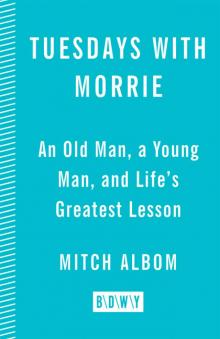 Tuesdays With Morrie
Tuesdays With Morrie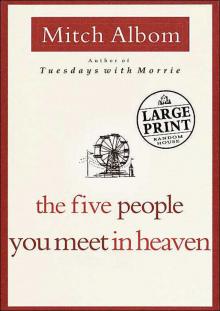 The Five People You Meet in Heaven
The Five People You Meet in Heaven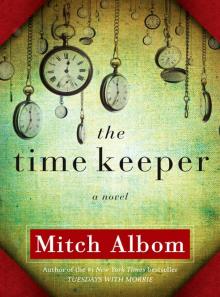 The Time Keeper
The Time Keeper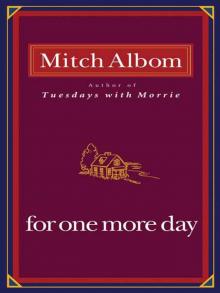 For One More Day
For One More Day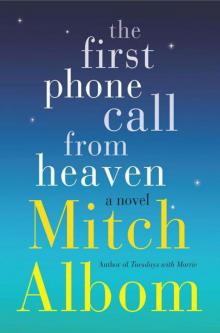 The First Phone Call From Heaven: A Novel
The First Phone Call From Heaven: A Novel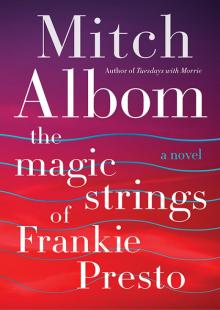 The Magic Strings of Frankie Presto
The Magic Strings of Frankie Presto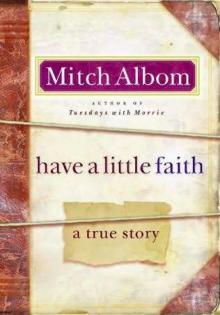 Have a Little Faith: A True Story
Have a Little Faith: A True Story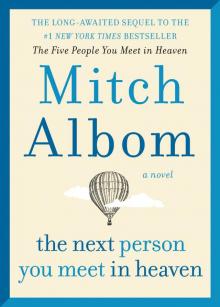 The Next Person You Meet in Heaven
The Next Person You Meet in Heaven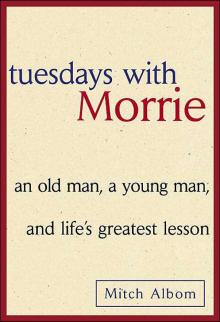 Tuesdays with Morrie: an old man, a young man, and life’s greatest lesson
Tuesdays with Morrie: an old man, a young man, and life’s greatest lesson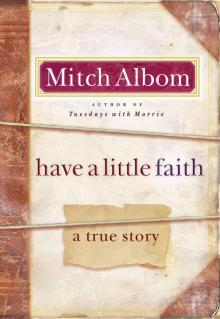 Have a Little Faith
Have a Little Faith